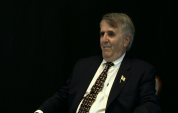5:42 | Bruce D'Agostino did well in business following his service in Vietnam. One thing he didn't do was have much contact with fellow veterans, but that changed in 1987 when he met a POW/MIA activist at the Vietnam Veterans Memorial. He began loosening red tape, and eventually made back channel contact with the Vietnamese government.

Told he was at the top of the list to be drafted, Bruce D'Agostino enlisted in the Air Force to get some electronics training. Based in Japan with a communications squadron, he sought an assignment in Vietnam because he didn't feel right sitting there while a war was going on. He was already a crack shot, thanks to a Marine sniper.
Bruce D'Agostino took a temporary duty assignment in Saigon repairing teletype machines. The Air Force technician and his crew worked long days so they could have some free time. He used his to become a photographer, inserting himself into both government functions and battlefields. At the latter he learned firsthand the vagaries of the rules of engagement.
Bruce D'Agostino's most vivid memory of Vietnam is leaving. Instead of waiting on a commercial flight, he hopped a military plane to his home base in Japan. Climbing aboard in darkness, he was startled when the lights came on and revealed the plane's cargo. His life was changed during that flight.
Bruce D'Agostino had many contacts with civilians in Vietnam, but was wary of anyone he didn't know well. You never knew who could be the enemy. Warned to watch out for unwitting children carrying possible booby traps, he found himself in exactly that situation when a little boy ran up with something in his hand.
His uncle was a veteran, so Bruce D'Agostino corresponded with him while in Vietnam, feeling he would understand what he was going through. The disgust began to build as he witnessed the nonchalant treatment of the remains of dead soldiers and read the ridiculous undercounts of casualties by the top brass. His top secret clearance gave him access to material which convinced him that they had no intention of winning the war.
Mentioning that he served in Vietnam would clear the area around him in a bar, remembers Bruce D'Agostino. The World War II vets weren't much better, and told him that Vietnam wasn't a real war. Korean War vets were more understanding, but no one, not even his father, wanted to talk about Vietnam.
It was difficult readjusting to civilian life after being in a war zone, says Bruce D'Agostino. No one knows what you went through over there. He reflects on his growing involvement in veterans' issues and points out that the Vietnam war had a very high volunteer rate, men who felt that they couldn't do less than their fathers and uncles did.